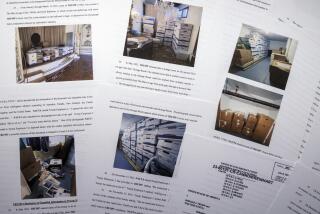Mariana Pfaelzer
Rejected in 1957 by some law firms because she was a woman, Mariana Pfaelzer, now 59, finally found a spot with the politically powerful firm of Wyman, Bautzer, Rothman and Kuchel--and wound up a partner. After serving on of the Los Angeles Police Commission for four years, Pfaelzer, a liberal Democrat, was appointed by President Jimmy Carter in 1978 as the first female federal trial judge in California’s history.
Q: What’s the toughest part of being a judge? A: Dealing with the criminal cases. It’s very difficult achieving an attitude that is fair on both sides. I’m a liberal, but I do not consider myself soft on crime. I have actually fought hand-to-hand with a burglar who came into my house, and I do not think I’m any better off for that experience. I turned out to be more of a fighter than I thought I was, but it was a terrifying experience. Q: You are thought of, nonetheless, as a moderate sentencer in an era of the so-called tough judge. Do you think sentences are becoming too harsh in the federal courts? A: I don’t think there’s too much emphasis on tough sentencing. I have a lot of confidence in the judgment of my brothers and sisters on this court. When you ask jurors these days if they have been the victim of a crime in the last few years, two-thirds of them will raise their hands. As you remain a judge over the years, you have a tendency to sentence longer. You don’t believe in probation as much as when you came on because you see it fail so often. I try to be reasonable about what I do. The most difficult thing here is sentencing. We have no reliable data on who’s coming back and who isn’t. Q: When you were appointed to the bench, did you run into any of the discrimination you experienced in the late 1950s as a female lawyer? A: None at all. The other judges were wonderful to me. They had a dinner to welcome me to the court.
One thing that delights me is how many women there are now; it’s something you can become very emotional about. Out there in that courtroom are a lot of women overachievers. The woman still has to be the super-achiever to get here, but a lot has changed. I’m really looking forward to seeing it all play out. Q: As a liberal Democrat, do you have any concerns about the Reagan Administration’s approach to the criminal justice system or the selection process for new judges? Is this a bad time for you to be a judge? A: There’s no bad political time to have this job. The good thing about a trial court is that there’s no need for consensus. I’m concerned about this: I don’t want to see this “war on crime” and “war on drugs” lead us into a situation where we forget the court is a preservation of individual liberty. I don’t want to see the techniques that are employed get out of hand. As for the selection of judges, it’s inevitably a political process. With the Reagan appointees, I think we’re going to get good people, the same as we got before. I would only be concerned if they asked the candidates beforehand about issues. I think that’s wrong. Q: A few judges with low reversal rates might be accused of dodging the hard decisions, but that’s not your style. Still, you have one of the lowest reversal rates of all -- just 4% last year. What’s your secret? A: I’m not sure why that is. I have a tendency to work over and over and over again on something. If I think a decision is very difficult, I often give it to a brand-new law clerk rather than someone who’s already familiar with my thinking. If you do that, you sometimes are convinced that parts of what you did are wrong. Q: In Los Angeles, the publicity around the DeLorean case last year led some judges to issue restraining orders banning lawyers from talking to the press in other cases. What’s your view? A: I think that lawyers should be able to talk to the press. I think restraining orders are wrong. I’m opposed to them. Q: What would you like to do if you had some spare time? A: If I had the time, I’d go back to school. I’d study two things: I’d take some architecture courses and several art courses. I’m very interested in Romanesque architecture and contemporary art. But I don’t have the time. I don’t have the time to do the things I have to do. I don’t regret it because I have a very interesting job. I also am a great gardener, and when I say I’m a great gardener, I mean it. Q: The courts are clogged with back cases, and most judges work hard . Even so, you are known as one of the hardest working federal judges. Do you ever think about slowing down? A: I’ve always associated with people who work hard. I believe in work. I think work defines you. It makes a lot of difference in the way you view your life. And this is one of the most exciting jobs in the world.
One wonderful contribution on this court is from the senior judges who could go into retirement but who keep on working, and I look forward to doing that too.
More to Read
Sign up for Essential California
The most important California stories and recommendations in your inbox every morning.
You may occasionally receive promotional content from the Los Angeles Times.










